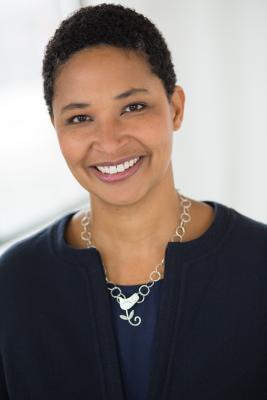Our Common Purpose: Reinventing American Democracy for the 21st Century
A Matrix Distinguished Lecture by Danielle Allen, James Bryant Conant University Professor at Harvard University, and Director of Harvard’s Edmond J. Safra Center for Ethics

Please join us on February 3, 2021 at 12:00 PST (3:00pm ET) for a Matrix Distinguished Lecture by Danielle Allen, James Bryant Conant University Professor at Harvard University, and Director of Harvard’s Edmond J. Safra Center for Ethics.
 Professor Allen’s lecture will focus on the findings of Our Common Purpose: Reinventing Democracy for the 21st Century, a report by the American Academy’s Commission on the Practice of Democratic Citizenship. Allen served as co-chair of the Commission, which convened weekly for two years in support of this project. As detailed in the report, the Commission was established to “consider what it means to be a good citizen in the twenty-first century, and to ask how all of us might obtain the values, knowledge, and skills to become still better citizens…. Through its recommendations, the Commission has looked to increase citizens’ capacity to engage in their communities, counter rising threats to democratic self-government, and rebuild trust in political institutions.” (To learn more, visit www.amacad.org/ourcommonpurpose or download the report here.)
Professor Allen’s lecture will focus on the findings of Our Common Purpose: Reinventing Democracy for the 21st Century, a report by the American Academy’s Commission on the Practice of Democratic Citizenship. Allen served as co-chair of the Commission, which convened weekly for two years in support of this project. As detailed in the report, the Commission was established to “consider what it means to be a good citizen in the twenty-first century, and to ask how all of us might obtain the values, knowledge, and skills to become still better citizens…. Through its recommendations, the Commission has looked to increase citizens’ capacity to engage in their communities, counter rising threats to democratic self-government, and rebuild trust in political institutions.” (To learn more, visit www.amacad.org/ourcommonpurpose or download the report here.)
The lecture will be introduced and moderated by Henry Brady, Dean of the Goldman School of Public Policy and Class of 1941 Monroe Deutsch Professor of Political Science and Public Policy at the University of California, Berkeley.
REGISTER TO ATTEND
About Danielle Allen
Danielle Allen, James Bryant Conant University Professor at Harvard University, and Director of Harvard’s Edmond J. Safra Center for Ethics, is a political theorist who has published broadly in democratic theory, political sociology, and the history of political thought. Widely known for her work on justice and citizenship in both ancient Athens and modern America, Allen is the author of The World of Prometheus: The Politics of Punishing in Democratic Athens (2000), Talking to Strangers: Anxieties of Citizenship since Brown vs. the Board of Education (2004), Why Plato Wrote (2010), Our Declaration: A Reading of the Declaration of Independence in Defense of Equality (2014), Education and Equality (2016), and Cuz: The Life and Times of Michael A. (2017). She is the co-editor of the award-winning Education, Justice, and Democracy (2013, with Rob Reich) and From Voice to Influence: Understanding Citizenship in the Digital Age (2015, with Jennifer Light). She is a former Chair of the Mellon Foundation Board, past Chair of the Pulitzer Prize Board, and a member of the American Academy of Arts and Sciences and the American Philosophical Society.
About Henry E. Brady
Henry Brady is Dean of the Goldman School of Public Policy (since 2009) and Class of 1941 Monroe Deutsch Professor of Political Science and Public Policy at the University of California, Berkeley. He received his PhD in Economics and Political Science from MIT in 1980. He has written on electoral politics and political participation, social welfare policy, political polling, political polarization and trust, and statistical methodology, and he has worked for the federal Office of Management and Budget and other organizations in Washington, D.C. He is past president of the American Political Science Association, past president of the Political Methodology Society of the American Political Science Association, and director of the University of California's Survey Research Center from 1998 to 2009. He is coauthor of Letting the People Decide: Dynamics of a Canadian Election (1992), which won the Harold Innis Award for the best book in the social sciences published in English in Canada; Voice and Equality: Civic Voluntarism in American Politics (1995), which won the Philip Converse Award for a book making a lasting contribution to public opinion research and the American Association for Public Opinion Research best book award; Expensive Children in Poor Families: The Intersection of Childhood Disability and Welfare (2000); Counting All the Votes: The Performance of Voting Technology in the United States (2001); and The Unheavenly Chorus: Unequal Political Voice and the Broken Promise of American Democracy (2012). He is co-editor of Rethinking Social Inquiry (2004), which won the Sartori Award for best book on qualitative methods; Capturing Campaign Effects (2006); and the Handbook of Political Methodology (2008). His most recent book is Unequal and Unrepresented: Political Inequality and the New Gilded Age (2018). Brady has also authored numerous articles on political participation, political methodology, the dynamics of public opinion, and other topics. He was elected a Fellow of the American Academy of Arts & Sciences in 2003 and a Fellow of the American Association for the Advancement of Science in 2006.
Photo Credit: Laura Rose



